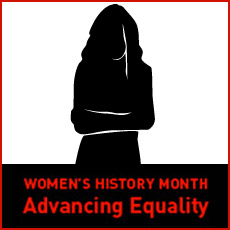
I'm nearly 50. I'm tremendously fortunate. I live in a safe neighborhood, I am comfortable, and I have the privilege of a terrific education and opportunities in life. I am not timid — I have spent much of my life suing states for violating women's rights. But when I think about Women's History Month, I think about the ways in which all too often, as I walk on the streets, I put my head down, how I feel the street is not my place. And I think about how little I and other women talk about this.
Today will be different.
I first remember it happening when I was around 14. I was in high school. I lived in the country. I had to walk a quarter of a mile from where the bus dropped me off to home. Guys driving by would sometimes call stuff out the window of their cars. Sometimes they slowed down. Sometimes they stopped the car to say things and offer me a ride. I was afraid. I didn't know if they would take no for an answer. I didn't know if I could run faster than they could. I knew bad things happened.
College. I was 20 feet or so from my dorm one night. A guy grabbed me from behind. He put his hands between my legs. He told me not to scream. I screamed. He ran. The cops asked me if I was frequently asked out on dates.
Life after college. I'm living in D.C. I'm walking on 18th or 17th Street. I'm walking with a friend. A man passes, walking in the opposite direction. He reaches behind to grab my ass as he goes. I turn. I point. I yell: "This man just grabbed my ass! Stop it!" People stare. I feel vindicated.
My first years of being a lawyer. I am traveling to give a talk at a university about women in the law. I am walking out of my office building. A man passing by stares and says, "Nice tits." I look down. I want to disappear.
Fast-forward 10 years. My niece is living with me while she does an internship. She talks of her commute on a packed rush hour subway. She tells of a guy rubbing against her. She tells herself it's just that the train is crowded. Then he puts his hand on her thigh. Then he starts to move his hand up her leg. She was too stunned, too in disbelief to do anything at the time. Several weeks later, the two of us are coming home and some guy says something. I turn and yell, "Stop harassing us!" He looks embarrassed. My niece smiles.
And now. I am walking to the subway. A man coming toward me says, "Good morning sexy. Want some [not printable]?" It's a Saturday. It's 6 a.m. It's New York City. There is no one else in sight. I think, as I did nearly 40 years ago, "Could I outrun him?"
In between each of these incidents, there were others too numerous to count — the whistle from a student the first time I spoke at a university; the guy who stood over me on the subway muttering very not nice things no one else could hear; the boss who patted my butt; and just the seven million comments, or so it seems, on every part of my anatomy and my attire and what someone would like to do with it, offered at every time of day, on streets both crowded and isolated.
Street harassment is pervasive. It's pernicious. But it's little discussed, and the pain it causes little understood. We don't talk about it in part because it's so normal; it's the fabric of life. And we don't talk about it because all too often the response is, "Why get so upset about a comment here and there?" That's the problem. Each comment, in isolation, may not seem that bad.
But for those of us wanting to move in the world, it's not just a comment here and there. It's a comment in the context of a culture. Some number of these comments come with following, touching, assaulting. Women know that.
It's a comment in a culture where I see its effect on me and other women. We put our heads down. We look ashamed. We look ashamed — for what? Because we were out? Because we had on a sleeveless top? Because we wore a skirt? The guys who commented, meanwhile, don't look down. They don't look ashamed. They sometimes even grin. That's all messed up. That's not the kind of world in which I want to live.
I offer this in the spirit of understanding — to give voice to an experience many of us have, to make the frustration and anger and fear some women have make sense, and to foster empathy. It's Women's History Month, and there are so many gains to celebrate. The world is so different in so many profound ways even from when I was young. But in terms of street harassment, there's still too little conversation, too little education, and too little change.
Sunday, March 20, was the first-ever International Anti-Street Harassment Day. If you've ever been harassed in public, learn about what you can do, and how to respond, by visiting the Stop Street Harassment website .
We're holding a month-long blog symposium on women's rights for Women's History Month. See all the blog posts here, and learn more about women's rights: Subscribe to our newsletter, follow us on Twitter, and like us on Facebook.
Stay informed
Sign up to be the first to hear about how to take action.
By completing this form, I agree to receive occasional emails per the terms of the ACLU's privacy statement.
By completing this form, I agree to receive occasional emails per the terms of the ACLU's privacy statement.

